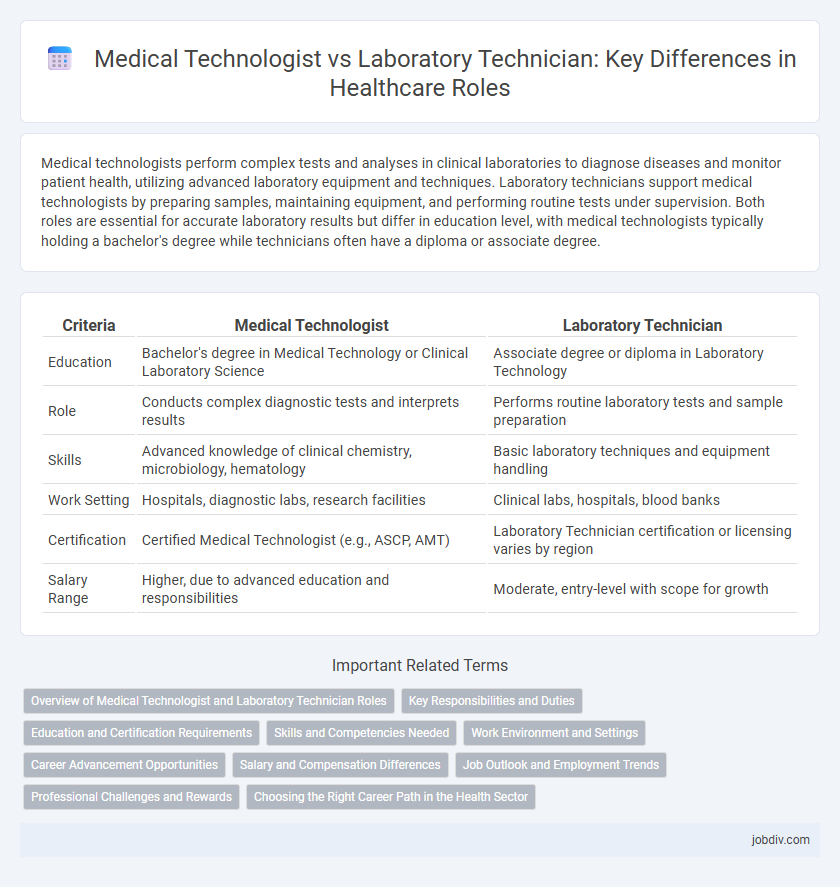Medical technologists perform complex tests and analyses in clinical laboratories to diagnose diseases and monitor patient health, utilizing advanced laboratory equipment and techniques. Laboratory technicians support medical technologists by preparing samples, maintaining equipment, and performing routine tests under supervision. Both roles are essential for accurate laboratory results but differ in education level, with medical technologists typically holding a bachelor's degree while technicians often have a diploma or associate degree.
Table of Comparison
| Criteria | Medical Technologist | Laboratory Technician |
|---|---|---|
| Education | Bachelor's degree in Medical Technology or Clinical Laboratory Science | Associate degree or diploma in Laboratory Technology |
| Role | Conducts complex diagnostic tests and interprets results | Performs routine laboratory tests and sample preparation |
| Skills | Advanced knowledge of clinical chemistry, microbiology, hematology | Basic laboratory techniques and equipment handling |
| Work Setting | Hospitals, diagnostic labs, research facilities | Clinical labs, hospitals, blood banks |
| Certification | Certified Medical Technologist (e.g., ASCP, AMT) | Laboratory Technician certification or licensing varies by region |
| Salary Range | Higher, due to advanced education and responsibilities | Moderate, entry-level with scope for growth |
Overview of Medical Technologist and Laboratory Technician Roles
Medical Technologists operate advanced laboratory equipment to perform complex diagnostic tests, analyze patient samples, and interpret results essential for accurate medical diagnoses. Laboratory Technicians support the testing process by preparing specimens, maintaining lab instruments, and conducting routine tests under supervision to ensure reliable data. Both roles are critical in clinical labs, but Medical Technologists require higher education and specialized training to handle sophisticated analyses.
Key Responsibilities and Duties
Medical Technologists perform complex laboratory tests, analyze body fluids, and operate sophisticated diagnostic equipment to assist in disease diagnosis and treatment. Laboratory Technicians are responsible for collecting samples, preparing specimens, and maintaining laboratory instruments under the supervision of technologists or pathologists. Both roles are essential in clinical laboratories, but Medical Technologists typically hold advanced degrees and handle more intricate analytical procedures.
Education and Certification Requirements
Medical Technologists typically hold a bachelor's degree in medical technology, clinical laboratory science, or a related field, requiring completion of accredited programs and clinical training. Laboratory Technicians often need an associate degree or certificate from a vocational program, emphasizing practical laboratory skills with less extensive coursework. Certification for Medical Technologists is commonly obtained through organizations like the ASCP Board of Certification, whereas Laboratory Technicians may pursue certifications such as the ASCP Laboratory Technician or state-specific licenses to validate competencies.
Skills and Competencies Needed
Medical technologists require advanced skills in clinical chemistry, hematology, microbiology, and molecular diagnostics, alongside proficiency in operating sophisticated laboratory instruments and performing complex data analysis. Laboratory technicians focus on specimen collection, basic laboratory testing, equipment maintenance, and adherence to strict safety and quality control protocols. Both roles demand strong attention to detail, critical thinking, and knowledge of laboratory information systems, but medical technologists typically possess deeper analytical competencies and scientific expertise.
Work Environment and Settings
Medical Technologists typically work in large, well-equipped hospital laboratories or specialized diagnostic centers where they handle complex testing equipment and advanced procedures. Laboratory Technicians often operate in smaller clinics or routine testing labs, performing basic assays and sample preparation under supervision. Both roles require strict adherence to safety protocols, but Medical Technologists usually engage in more analytical and interpretive tasks within high-pressure environments.
Career Advancement Opportunities
Medical Technologists typically have a broader scope of practice and higher educational requirements, such as a bachelor's degree in medical technology or a related field, which opens the door to more diverse career advancement opportunities including supervisory and specialized roles. Laboratory Technicians often start with an associate degree or certification, gaining essential hands-on experience but facing more limited upward mobility compared to technologists. Advancement for Medical Technologists can lead to positions like laboratory managers, clinical laboratory supervisors, or roles in research and development, whereas Laboratory Technicians may need additional education to progress beyond technical support roles.
Salary and Compensation Differences
Medical technologists generally earn higher salaries than laboratory technicians due to their advanced education and specialized skills, with average annual earnings ranging from $55,000 to $75,000 compared to $35,000 to $50,000 for technicians. Compensation for medical technologists often includes benefits such as health insurance, retirement plans, and performance bonuses, reflecting their critical role in diagnostic processes. Laboratory technicians typically receive lower base salaries and fewer incentives, but entry-level positions may offer pathways to increased pay through experience and certification.
Job Outlook and Employment Trends
Medical technologists typically experience stronger job outlooks due to their advanced education and specialized skills, with employment growth projected at about 7% from 2022 to 2032, reflecting the expanding demand for sophisticated diagnostic testing. Laboratory technicians have a moderately positive employment trend, expected to grow around 5%, driven by increasing healthcare needs but with fewer opportunities compared to medical technologists. Both roles benefit from advancements in medical technology and aging populations, yet medical technologists often secure higher salaries and leadership positions within clinical laboratories.
Professional Challenges and Rewards
Medical Technologists face complex diagnostic challenges requiring advanced analytical skills and extensive knowledge of laboratory procedures, often managing high-stakes testing that directly impacts patient care. Laboratory Technicians encounter repetitive tasks with a focus on specimen preparation and equipment maintenance, offering rewards through operational consistency and supporting clinical workflows. Both professions demand precision and adherence to safety protocols, providing a sense of purpose in contributing to accurate medical diagnoses and treatment.
Choosing the Right Career Path in the Health Sector
Medical technologists typically hold a bachelor's degree and perform complex laboratory tests crucial for accurate diagnosis and treatment, while laboratory technicians often have an associate degree and handle routine sample processing. Choosing between these careers depends on the desired level of responsibility, technical skill, and educational investment, with medical technologists engaging in advanced analysis and quality control. Both roles are essential in healthcare, but medical technologists usually experience broader career advancement opportunities and higher salary potential.
Medical Technologist vs Laboratory Technician Infographic

 jobdiv.com
jobdiv.com